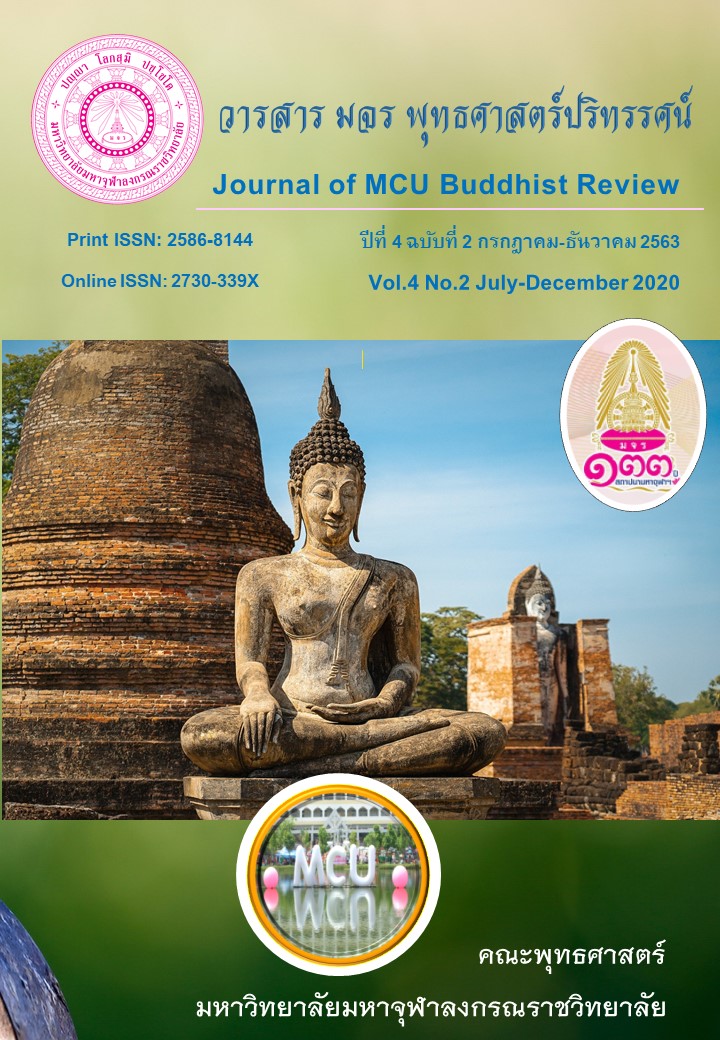ความมั่นคงแห่งพระพุทธศาสนาตามแนวปาสาทิกสูตร
Main Article Content
บทคัดย่อ
บทความเรื่องความมั่นคงแห่งพระพุทธศาสนาตามแนวปาสาทิกสูตร จากการศึกษาพบว่า ปาสาทิกสูตรเป็นพระสูตรที่พระพุทธเจ้าแสดงแก่พระจุนทะและพระอานนท์ โดยปรารภความแตกแยกในหมู่สาวกภายหลังนิครนถ์นาฏบุตรถึงแก่กรรมไม่นาน พระพุทธองค์แสดงให้ทราบเป็นนัยว่า พระพุทธศาสนาจะไม่แตกแยกเหมือนลัทธินิครนถ์ เพราะมีลักษณะและองค์ประกอบต่างกัน ทรงรับสั่งว่า ศาสนาที่จำดำรงอยู่นานนั้นต้องมีองค์ประกอบที่ดี 3 อย่าง คือ (1) ศาสดา (2) หลักธรรม และ (3) สาวก ศาสนาที่สมบูรณ์จะต้องมีศาสดาที่บวชนาน ฉลาดรอบรู้ และมีสาวกที่เป็นพุทธบริษัท 4 (ภิกษุ ภิกษุณี อุบาสก อุบาสิกา) เป็นผู้รู้ธรรมครบถ้วนและถูกต้อง กล้าหาญ สามารถชี้แจ้งคำกล่าวล่วงเกินของศาสนาอื่นได้ มีการสังคายนาคำสอนให้ครบถ้วนและถูกต้องตามที่พระพุทธเจ้าสอนโดยเฉพาะโพธิปักขิยธรรม 37 ประการ ด้านการดำเนินชีวิตของภิกษุ ให้อาศัยปัจจัย 4 จากอุบาสกอุบาสิกา และตอบแทนด้วยการสั่งสอนธรรม ไม่บำเพ็ญอัตตกิลมถานุโยคและกามสุขัลลิกานุโยค พุทธสาวกชี้แจงข้อสงสัยเฉพาะข้อที่พระพุทธเจ้าพยากรณ์ หมั่นบำเพ็ญสติปัฏฐาน 4 เพื่อกำจัดมิจฉาทิฏฐิ และพัฒนาตนตามหลักไตรสิกขา คือ ศีล (พัฒนาพฤติกรรม) สมาธิ (พัฒนาจิต) และ ปัญญา (พัฒนาปัญญา)
Article Details
- บทความที่ได้รับการตีพิมพ์เป็นลิขสิทธิ์ของวารสาร มจร พุทธศาสตร์ปริทรรศน์
- ข้อความใดๆ ที่ปรากฎในบทความที่ได้รับการตีพิมพ์ในวารสาร ถือเป็นความรับผิดชอบของผู้เขียนบทความ และข้อคิดเห็นนั้นไม่ถือว่าเป็นทัศนะและความรับผิดชอบของกองบรรณาธิการวารสาร มจร พุทธศาสตร์ปริทรรศน์
เอกสารอ้างอิง
พระธรรมปิฎก (ป.อ. ปยุตฺโต). (2539). สถานการณ์พระพุทธศาสนา กระแสไสยศาสตร์. กรุงเทพมหา นคร : มูลนิธิพุทธธรรม.
มหาจุฬาลงกรณราชวิทยาลัย. (2539). พระไตรปิฎกภาษาไทย ฉบับมหาจุฬาลงกรณราชวิทยาลัย.กรุงเทพมหานคร: โรงพิมพ์มหาจุฬาลงกรณราชวิทยาลัย.
มหาจุฬาลงกรณราชวิทยาลัย. (2539). อรรถกถาภาษาบาลี ฉบับมหาจุฬาอฏฺฐกถา. กรุงเทพมหานคร: โรงพิมพ์มหาจุฬาลงกรณราชวิทยาลัย.
วศิน อินทสระ. (2553). พระไตรปิฎกฉบับที่ทำให้ง่ายแล้ว. พิมพ์ครั้งที่ 6. กรุงเทพมหานคร : สำนักพิมพ์ธรรมดา.
สุรพศ ทวีศักดิ์. (2560). จากพุทธศาสนาแห่งรัฐสู่พุทธศาสนาที่เป็นอิสระจากรัฐ. กรุงเทพมหานคร: สำนักพิมพ์เคล็ดไทย.


